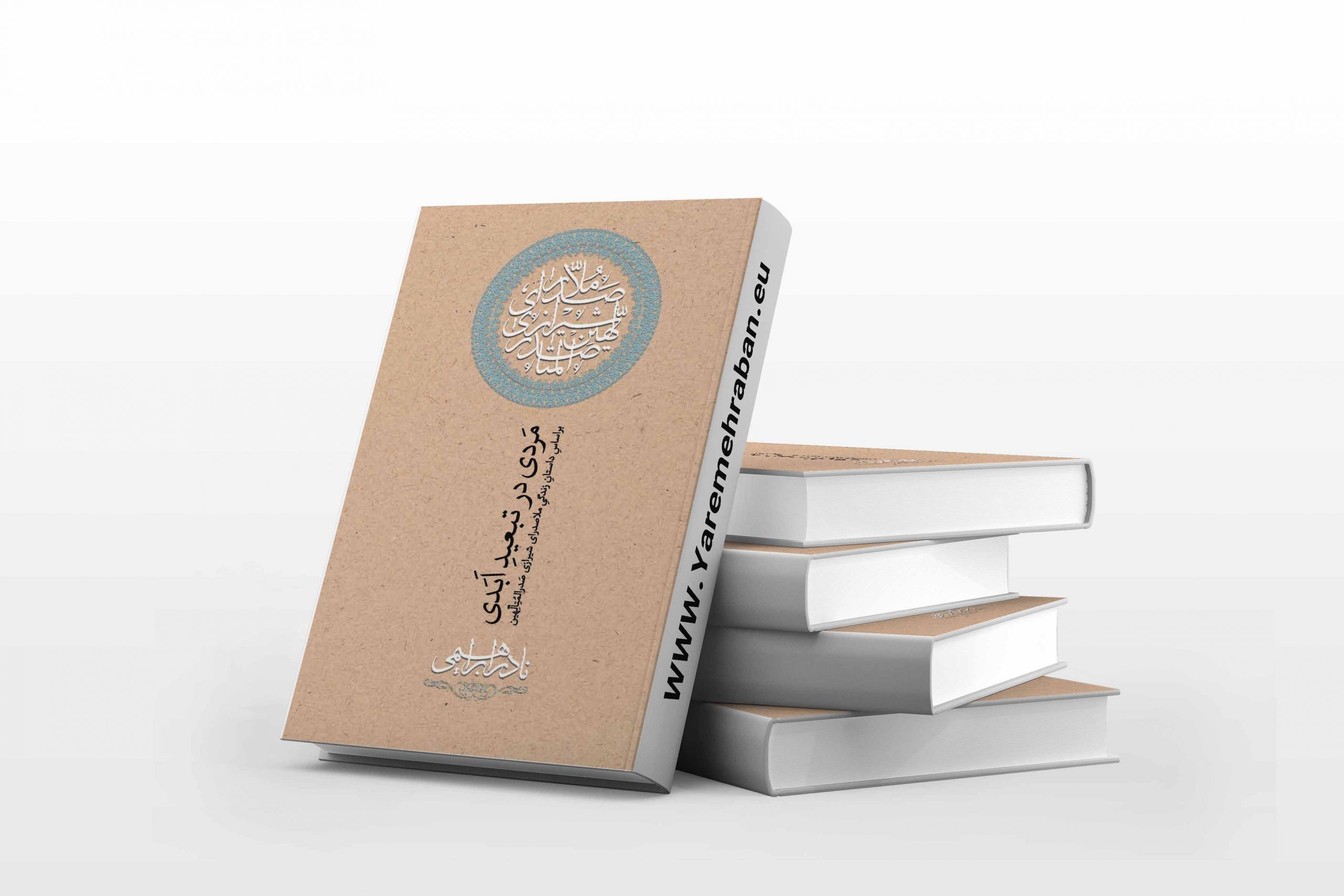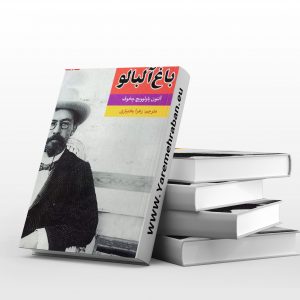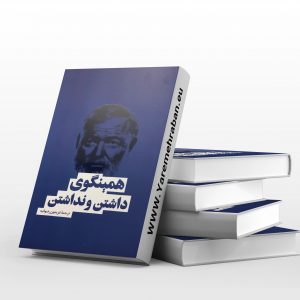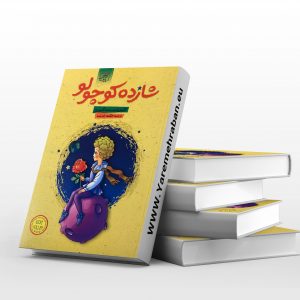Description
A Man in Eternal Exile is a novel by the talented and famous Iranian writer Nader Ebrahimi, based on the life of Sadr al-Muta’allehin, Mulla Sadra of Shiraz. In this unique novel, Ebrahimi follows both the life of Mulla Sadra and the evolution of his philosophical and mystical ideas.
About the book A Man in Eternal Exile
Nader Ebrahimi has acted very artistically in this novel. He simultaneously pursues two separate issues and approaches. One is the personal life of Mulla Sadra and the other is how his first special philosophical thoughts emerged.
Time is fluid in this novel and Ebrahimi has tried to include all aspects of Mulla Sadra’s personality in the text of the book. The novel begins with Mulla Sadra’s exile by Shah Abbas, and we find him in the middle of a conversation with his wife, who complains of fatigue and illness of her newborn daughter.
The novel as a whole consists of sixteen separate but interconnected chapters.
The chapters each with separate titles and in a separate chapter depict sensitive and special moments of Mulla Sadra Shirazi’s life as a flashback for the audience.
In addition to reading the life of Mulla Sadra Shirazi, this book also provides information about the lives of three famous contemporary philosophers of Mulla Sadra, namely Mirdamad, Mirfanderski and Sheikh Bahauddin Ameli (Judge of Judges).
To whom do we recommend reading The Man in Eternal Exile?
Those who are interested in historical novels and the stories of great Iranian personalities are invited to read this book.
About Nader Ebrahimi
Nader Ebrahimi is a contemporary Iranian novelist who, in addition to writing novels and short stories, has also worked in the fields of filmmaking, songwriting, translation, and journalism. Ebrahimi, along with Bahram Beizai and Ebrahim Golestan, are artists who have worked and are well known in both cinema and literature.
Nader Ebrahimi was born on April 4, 1961 in Tehran. His mother was from Larijani living in Tehran. His father, Ata al-Mulk Ibrahimi, was a descendant of Ibrahim Khan Zahir al-Dawla, the famous ruler of Kerman during the Qajar period, who was exiled by Reza Shah of Pahlavi to Meshkinshahr while being demoted from Kerman. There is still a pen named after him in the suburbs of Meshkinshahr (Atman pen) and his relatives (Ebrahimi of Kerman) are known and famous in the city and province of Kerman.
Nader spent his primary education in Tehran and entered the law school after graduating from the Dar al-Fonun high school with a degree in literature, but this field did not suit his mood. He left after two years, then continued his studies in English language and literature until his bachelor’s degree.
Ebrahimi had an adventurous life. He joined a political organization at the age of thirteen and went to prison several times. The two books of Ibn Mashghala and Abu al-Mashhaghal are a complete description of his life and activities, which he wrote in his own language. In these two books, he explains more about what he has done.
From the help of a mobile repair shop worker in the Turkmen Sahara, Mirzaei Hojreh Farsh in the bazaar, the management of a bookstore, a printing press worker, accounting and bank delivery, painting on scarves and clothes, pagination of newspapers and magazines, agriculture, calligraphy and painting to cultural works such as translator and editor Documentary filmmaking is one of the works he has experienced.
In addition to sports, Nader Ebrahimi was also active in the field of sports. He founded one of the oldest mountaineering groups called “Abarmard”. It was also very influential in the development of mountaineering and mountaineering ethics.
In all his busy years he did not give up writing. He started writing at the age of fifteen, and at the age of twenty-seven he published his first book, A House for the Night, published by Roozbehan. By 2001, in addition to hundreds of research and critique articles, he had published more than a hundred books, including long stories (novels) and short stories, children’s books, plays, screenplays, and research in various fields. In addition, several of his works have been translated into different languages of the world.
Nader Ebrahimi was traditionally introduced to Farzaneh Mansouri by her relatives, and after a little acquaintance, the two decided to get married. Farzaneh Mansouri said in one of her interviews about her acquaintance with Nader: “My acquaintance with Nader happened at a family party. We both had very traditional families, and in families like ours, the girl and the boy who were going to get married could not socialize much, but I, for example, was an intellectual and said that close relatives should give a few parties to get to know each other and get results.
In the last meeting, when they said that another party was enough and you had to decide, Nader and I went to a room and talked to two people. It was there that we talked about our habits and feelings, and told each other what we wanted from a good life, accepted each other, and got married. When I chose Nader and we were going to get married, he was a good young man, a mountaineer, talkative and working in the Civil Bank of that time, and one of his relatives was also my family. “At first glance, we may have fallen in love and got to know each other better in family gatherings, which led to marriage.”
Nader Ebrahimi has written and directed several documentaries, movies, as well as two TV series, and has composed songs for them. He also founded the first non-profit Iranian Studies Institute and spent a lot of money and effort traveling, filming, photographing and sliding from all over Iran and archiving them; But it was not recognized and used as it should be, and it stopped when the revolution and the war came.
He began his career in children’s literature with his wife at the same time as founding the Institute for Children and Adolescents. “Hamgam” received the titles of “Asia Publisher of Choice” and “World Publisher of Choice” from the Asian and World Children’s Book Illustration Festivals. Ebrahimi has received the first Bratislava Prize in the field of children’s literature, the first UNESCO Education Prize, the Iranian Book of the Year Award and several other awards.
Finally, Nader Ebrahimi died at the age of 72 on Thursday afternoon, June 6, 2008, after several years of struggling with the disease.
Introducing the book A Man in Eternal Exile by Nader Ebrahimi
Based on the life story of Mulla Sadra Shirazi, Sadr al-Mutallah.
It is a book like Khumkhaneh in which Mulla Sadra’s life-giving cup of wine has become rarer …
In the description of this book, this one point and part of it, I think, will suffice:
That every blind man with a cane in his hand knows that he is the “addressee”, this “book” is the blessing of awakening … “And this is a literary exile for Anx who wants closeness …
“Men and women on the path of truth, whether the kings will or not, are constantly in exile …”
Introducing the book A Man in Eternal Exile
A Man in Eternal Exile by Nader Ebrahimi is a biography of the great Iranian philosopher Mulla Sadra Shirazi. In this work, the development of mystical and philosophical thoughts and ideas of this philosopher is expressed and you will get acquainted with his thoughts while getting acquainted with his personal life.
Nader Ebrahimi has written the prose of this book in a very glorious and fascinating way with exemplary taste and talents. In the present book, he deals with all aspects of Mulla Sadra’s personality and the way in which his thoughts and ideas are formed, as well as theoretical wisdom.
The novel A Man in Eternal Exile has three important characters that Mulla Sadra has been a student of throughout his life and has proudly mentioned. The three are Mir Mohammad Baqir Astarabadi known as Mirdamad, Sheikh Baha’uddin Ameli known as the Judge of Judges and Abolghasem Mirfanderski.
This book, like most of Ebrahimi’s works, is depicted as a puzzle and has no linear narrative. A puzzle that consists of the childhood of Sadr al-Muta’allehin, the period of love and youth, the years of study and reaching the position of professor, and finally the years of his exile.
Nader Ebrahimi masterfully portrays all of Mulla Sadra’s greatness and greatness from his childhood, how he was separated from his peers and lived alone. He becomes an eternal exile.
Although it is difficult for philosophers to understand Mulla Sadra’s philosophical thoughts, Ebrahimi presents his thoughts in a simple and fluent way without even a shred of familiarity with Islamic wisdom in his work.
The most important and characteristic feature of Nader Ebrahimi’s pen in describing Mulla Sadra is the poetic expression of his character, actions and behavior, which he has done very well to be able to show the loving temperament of this philosopher.
Who is recommended to read the book of a man in eternal exile?
If you are interested in the writings and works of Nader Ebrahimi or you pay special attention to Islamic philosophy and wisdom, we recommend this book to you.
Get to know Nader Ebrahimi more:
Nader Ebrahimi (1315-1378) is a contemporary Iranian novelist and novelist. He has also worked in filmmaking, songwriting, translation and journalism. In the books of Ibn Mashghala and Abu al-Mashhaghal, he describes his life and the various activities and occupations he has experienced. In 1342, his first book called House for the Night was published and the story of insult was very popular in this book.
By 2001, more than a hundred books, articles, and reviews had been published by him, including feature and short stories, plays, screenplays, and books for children and adolescents. Several of his works have been translated into various languages.
In the field of children’s literature, Ebrahimi has won the first Bratislava Prize, the first UNESCO Education Prize, the Iranian Book of the Year Award, and several other awards. He also received the Fiction Award for Selected Fiction 20 Years After the Revolution for his seven-volume novel Smokeless Fire.
Among his books, we can mention the city I loved again, original copies, forty short letters to my wife, a quiet romance, lyric poems of the bad year, public places, the legend of the rain, the black millipede and the tales of the desert, and so on.
In a part of the audio book of a man in eternal exile, we hear:
– Grabbed by Ibrahim Khan! What has bothered you again today that my sword can not split in two?
– Does the rash appear from Qarakhan Khan?
– From your look, from your eyes, from your face, from your step, you said hello and you answered hello. Of everything. Hiding sadness is much harder than hiding happiness. Tears flow when they should, but laughter can be contained, and you know that we do so in the presence of kings.
Ebrahim Ghavam continues to arrive at the Shiraz Government House. Shah Abbas has been ruling Iran for a year and a half in Qazvin. But with all the hard youth, it is in line to steal and leave forty lasting and uniform pieces of that historical piece.
The Story of a Man in Eternal Exile
Mohammad Sadra of Shiraz was the son of one of the most influential men in Shiraz; Ibrahim Sadr Shirazi, who was close to the Safavid court.
Abraham provided all the facilities for his late-arrived only child, but his compassionate fear and paternal duties always compelled him, by reason of reason, to display his dreadful thoughts in such a glorious time that religion was the chandelier of the palace of the kings. Safavid was considered to prevent.
“Has he read philosophy?”
Philosophy and everything; But unfortunately, above all, he studied philosophy. My son is a prisoner of philosophy, Qara Khan. And I’m afraid of this; “Because he does not see in the usual way and does not judge according to the jurists of the time.”
Nader Ebrahimi (born April 4, 1961 in Tehran – died June 6, 2008, Tehran) was a contemporary Iranian novelist. In addition to writing novels and short stories, he has worked in filmmaking, songwriting, translation, and journalism. Ebrahimi, along with Bahram Beizai and Ebrahim Golestan, is one of the few Iranian speakers who has worked and been known in both cinema and literature.
Excerpts from The Man in Eternal Exile (text pleasure)
Man was created to be able to Muhammad, not to be able to. If God wanted the human incapacity, He would not have created from the human principle.
Be patient, friends, companions, loyalists! Endure hardship for the sake of God; But do not listen to hardship. Tolerating grief does not mean grief. Tolerating pain is more than accepting pain. Hardship is a test from the truth and is a shortcut to peace and happiness.
Stinginess comes from the rot of the soul, not from the tightness of the hand.
1- Introducing the book on YouTube
2- Introducing the book in Aparat














Reviews
There are no reviews yet.